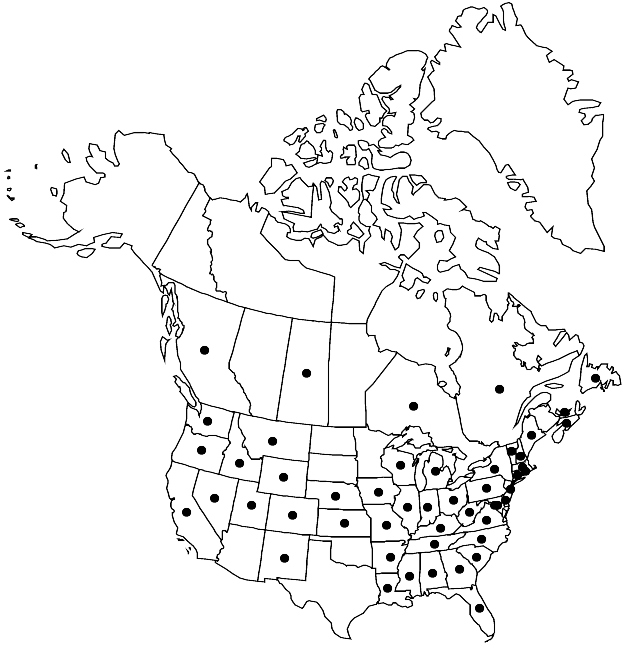Difference between revisions of "Lepidium campestre"
in W. Aiton and W. T. Aiton, Hortus Kew. 4: 88. 1812.
FNA>Volume Importer |
FNA>Volume Importer |
||
| Line 10: | Line 10: | ||
|name=Thlaspi campestre | |name=Thlaspi campestre | ||
|authority=Linnaeus | |authority=Linnaeus | ||
| + | |rank=species | ||
|publication_title=Sp. Pl. | |publication_title=Sp. Pl. | ||
|publication_place=2: 646. 1753 | |publication_place=2: 646. 1753 | ||
| Line 16: | Line 17: | ||
|name=Neolepia campestris | |name=Neolepia campestris | ||
|authority=(Linnaeus) W. A. Weber | |authority=(Linnaeus) W. A. Weber | ||
| + | |rank=species | ||
}} | }} | ||
|hierarchy=Brassicaceae;Brassicaceae tribe Lepidieae;Lepidium;Lepidium campestre | |hierarchy=Brassicaceae;Brassicaceae tribe Lepidieae;Lepidium;Lepidium campestre | ||
| Line 39: | Line 41: | ||
-->{{#Taxon: | -->{{#Taxon: | ||
name=Lepidium campestre | name=Lepidium campestre | ||
| − | |||
|authority=(Linnaeus) W. T. Aiton in W. Aiton and W. T. Aiton | |authority=(Linnaeus) W. T. Aiton in W. Aiton and W. T. Aiton | ||
|rank=species | |rank=species | ||
| Line 55: | Line 56: | ||
|publication year=1812 | |publication year=1812 | ||
|special status= | |special status= | ||
| − | |source xml=https://jpend@bitbucket.org/aafc-mbb/fna-data-curation.git/src/ | + | |source xml=https://jpend@bitbucket.org/aafc-mbb/fna-data-curation.git/src/f50eec43f223ca0e34566be0b046453a0960e173/coarse_grained_fna_xml/V7/V7_928.xml |
|tribe=Brassicaceae tribe Lepidieae | |tribe=Brassicaceae tribe Lepidieae | ||
|genus=Lepidium | |genus=Lepidium | ||
Revision as of 22:20, 16 December 2019
Annuals; densely hirsute. Stems simple from base, erect, unbranched or branched distally, (0.8–)1.2–5(–6.3) dm. Basal leaves rosulate; petiole (0.5–)1.5–6 cm; blade oblanceolate or oblong, (1–)2–6(–8) cm × 5–15 mm, margins entire, lyrate, or pinnatifid. Cauline leaves sessile; oblong, lanceolate, or narrowly deltate-lanceolate, (0.7–)1–4(–6.5) cm × (2–)5–10(–15) mm, base sagittate or auriculate, margins dentate or subentire. Racemes much-elongated in fruit; rachis hirsute, trichomes spreading, straight. Fruiting pedicels horizontal, straight or slightly recurved, (terete), (3–)4–8(–10) × 0.3–0.4 mm, hirsute. Flowers: sepals oblong, (1–)1.3–1.8 × 0.6–0.8 mm; petals white, spatulate, (1.5–)1.8–2.5(–3) × (0.2–)0.5–0.7 mm, claw 0.6–1 mm; stamens 6; filaments (1.2–)1.5–1.8(–2) mm, (glabrous); anthers 0.3–0.5 mm. Fruits broadly oblong to ovate, (4–)5–6(–6.5) × (3–)4–5 mm, (curved adaxially), apically broadly winged, apical notch (0.2–)0.4–0.6 mm deep; valves thin, papillate except for wing, not veined; style 0.2–0.5(–0.7) mm, slightly exserted beyond, or included in, apical notch. Seeds (dark brown), ovoid, 2–2.3(–2.8) × 1–1.4 mm. 2n = 16.
Phenology: Flowering May–Jun.
Habitat: Roadside, pastures, gardens, open flats, pine woodlands, rocky slopes, forests, waste grounds, disturbed areas, meadows, fields
Elevation: 0-2600 m
Distribution

B.C., Nfld. and Labr. (Nfld.), N.S., Ont., P.E.I., Que., Sask., Ala., Ark., Calif., Colo., Conn., Del., D.C., Fla., Ga., Idaho, Ill., Ind., Iowa, Kans., Ky., La., Maine, Md., Mass., Mich., Miss., Mo., Mont., Nebr., Nev., N.H., N.J., N.Mex., N.Y., N.C., Ohio, Oreg., Pa., R.I., S.C., Tenn., Utah, Vt., Va., Wash., W.Va., Wis., Wyo., Europe, Asia, introduced also in South America, South Africa.
Discussion
Selected References
None.
